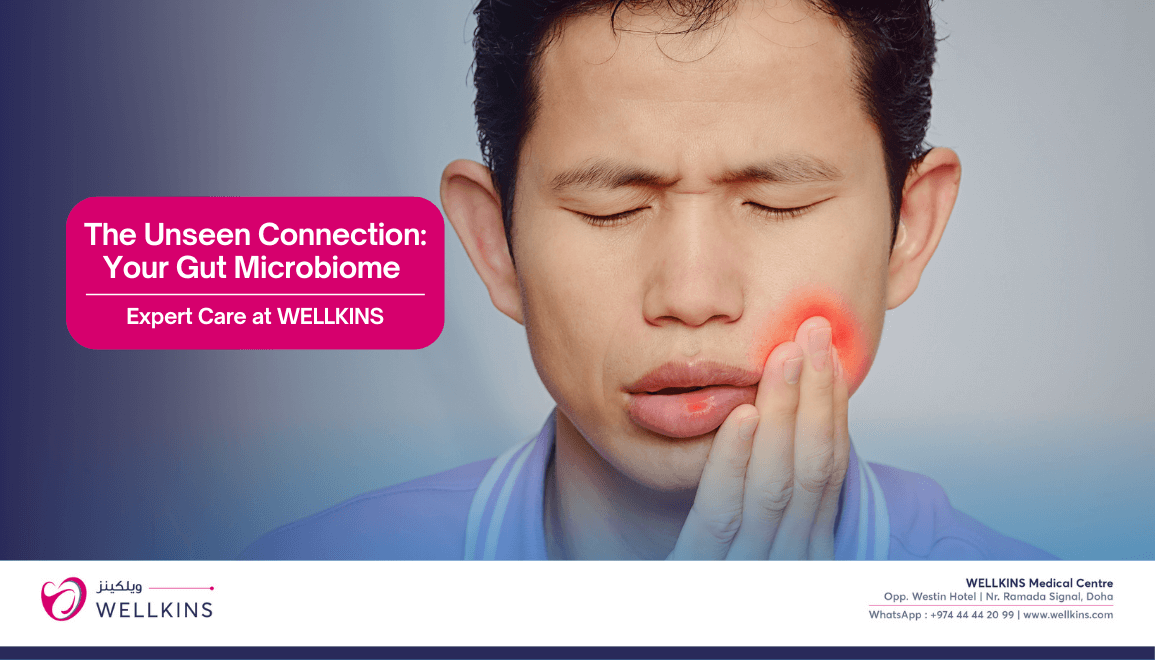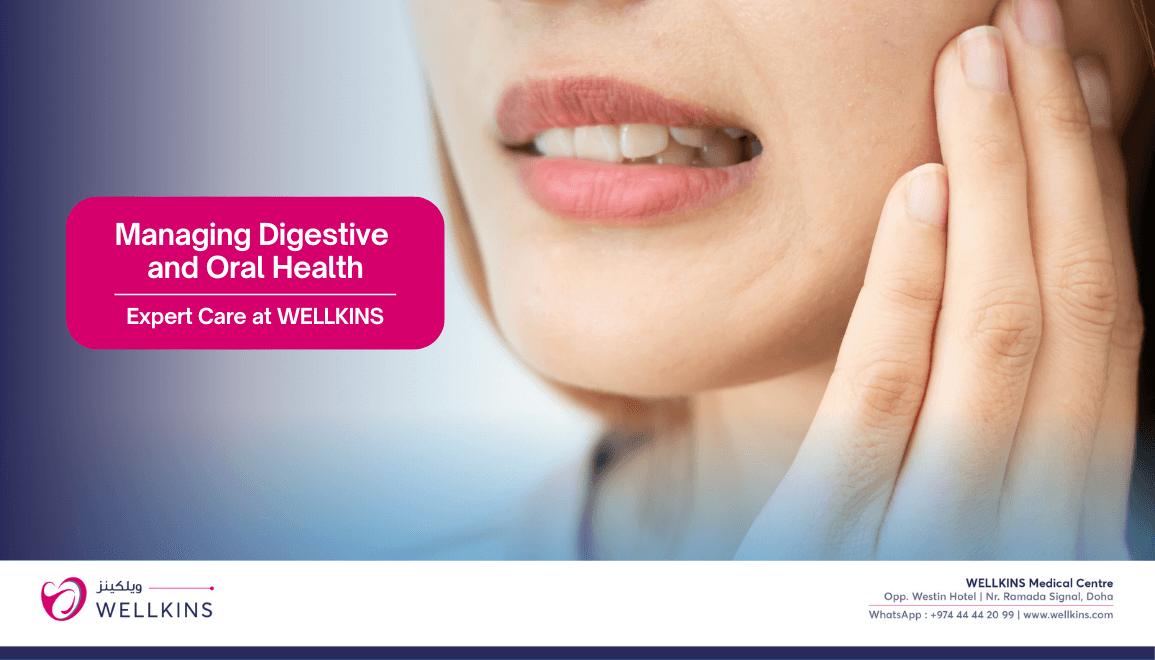Author: Dr. Ayisha Anwar, General Practitioner Wellkins Medical Centre
Mouth ulcers, those small, painful sores that appear inside your mouth, are a common and frustrating ailment that can make eating, drinking, and even talking a challenge. While they are often dismissed as a simple irritation from biting your cheek or a minor vitamin deficiency, persistent or recurring mouth ulcers can be a significant sign of a deeper underlying issue. The latest research is increasingly highlighting a crucial link between our oral health and our digestive system, revealing that what’s happening in your gut can manifest as a problem in your mouth. At Wellkins Medical Centre, we believe in a holistic approach to health, which is why we’re exploring how your gut health might be the real reason behind your recurring mouth ulcers.
“The familiar sting of a mouth ulcer is a common disruption, but their frequent or persistent return can signal deeper issues. In Qatar, understanding these root causes is crucial. There exist a strong link between oral health and our gut. Hence the recurrent mouth ulcers often surprisingly indicate underlying digestive imbalances.”
The Unseen Connection: Your Gut-Mouth Axis
The human body is a single, interconnected ecosystem, and the mouth and gut are linked by more than just the esophagus. They are both home to trillions of microorganisms a diverse and complex community known as the microbiome. This intricate community, which includes bacteria, viruses, and fungi, plays a fundamental role in maintaining your overall health. When the delicate balance of good and bad bacteria is disturbed in the gut a condition called gut dysbiosis it can trigger a cascade of issues that affect the entire body, including your oral cavity.

A healthy gut microbiome is absolutely essential for:
Efficient Nutrient Absorption: It breaks down complex carbohydrates and fibers, producing short-chain fatty acids that nourish the gut lining and help the body absorb vital vitamins and minerals from the food you eat. A disrupted microbiome can lead to malabsorption, making you deficient in key nutrients.
Robust Immune Regulation: A significant portion of your immune system resides in your gut. A balanced gut flora helps to train and regulate the immune response, teaching it to distinguish between harmful invaders and beneficial microbes. When this balance is off, your immune system can become overactive or compromised.
Systemic Inflammation Control: A healthy gut acts as a barrier, preventing harmful substances from entering the bloodstream. When this barrier is compromised, it can trigger low-grade, chronic systemic inflammation. This inflammation can manifest in various ways throughout the body, including the delicate tissues of your mouth, leading to ulcer formation.
Gut-Related Causes of Mouth Ulcers
Recurring mouth ulcers are often a powerful red flag from your body, signaling that something is amiss in your digestive system. Specific gut related issues that can trigger painful oral sores include:
Nutritional Deficiencies due to Malabsorption: A common link between gut health and mouth ulcers is the poor absorption of key nutrients. Conditions like Crohn’s disease, celiac disease, or even a generalized state of gut dysbiosis can impair the gut’s ability to absorb vital vitamins and minerals, such as Vitamin B12, iron, and folic acid. These nutrients are crucial for maintaining the health and integrity of your oral tissues, and a deficiency can led to ulcer formation.
Inflammatory Bowel Disease (IBD): Individuals with chronic inflammatory conditions like Crohn’s disease and ulcerative colitis often experience extra intestinal manifestations, including persistent and painful mouth ulcers. These ulcers, often referred to as aphthous ulcers, are a direct result of the systemic inflammatory state caused by the disease and can be a key diagnostic clue for physicians.
Leaky Gut Syndrome: This is a condition where the intestinal lining becomes more permeable than it should be. This “leaky” barrier allows toxins, undigested food particles and harmful bacteria to leak into the bloodstream, triggering a widespread immune and inflammatory response throughout the body. This chronic inflammation can present as painful ulcers in the mouth and on other mucous membranes.
Food Sensitivities and Allergies: For some people, mouth ulcers are a clear symptom of an undiagnosed food sensitivity or allergy. When an individual consumes a trigger food, the immune system in the gut launches an inflammatory response. This inflammation can then manifest in the mouth, leading to the formation of ulcers. Common culprits can include gluten, dairy, or certain acidic foods.
Small Intestinal Bacterial Overgrowth (SIBO): An overgrowth of bacteria in the small intestine can lead to nutrient malabsorption and an inflammatory response. This can indirectly cause mouth ulcers by leading to deficiencies in essential B vitamins and by creating a low-grade inflammatory state.
When to Seek Medical Attention for mouth ulcer in Qatar
While a single, minor mouth ulcer can often be managed with home remedies, it’s crucial to seek professional medical attention if:

The ulcers are persistent or recurring: They appear frequently, last longer than two weeks, or do not respond to typical over-the-counter treatments.
They are unusually large, painful, or numerous: You have severe difficulty eating, drinking, or speaking, or they cover a significant area of your mouth.
They are accompanied by other systemic symptoms: You also experience digestive issues like chronic diarrhea or constipation, fever, a skin rash, or joint pain, which may signal a broader, underlying condition.
You have a known risk factor: You have a personal or family history of digestive disorders like IBD or celiac disease, or an autoimmune condition.
These symptoms are key indicators that the mouth ulcers are not a superficial issue but a symptom of a deeper-rooted medical problem that requires an accurate diagnosis and a tailored treatment plan from a healthcare professional.
Solutions for mouth ulcers
To effectively manage mouth ulcers linked to gut health, it’s essential to address the root cause, not just the symptoms. This involves more than just topical gels; it requires a holistic and comprehensive approach to restoring your digestive balance.
Targeted Dietary Adjustments: Begin with an elimination diet under medical supervision to identify and remove potential food sensitivities that may be triggering inflammation. Focus on an anti-inflammatory diet rich in whole foods, including fruits, vegetables and lean proteins. Incorporate probiotic-rich foods like yogurt, kefir, and fermented vegetables to help restore a healthy gut microbiome, and prebiotics, found in bananas, onions, and garlic, to nourish the beneficial bacteria.
Nutritional Supplementation: If your medical assessment confirms a deficiency in iron, Vitamin B12, or folate, your doctor will likely recommend targeted supplementation. These supplements are vital not only for healing existing ulcers but also for strengthening your body’s tissues to prevent their recurrence.
Proactive Stress Management: The gut-brain axis is a powerful connection. Chronic stress can profoundly disrupt your gut microbiome, weaken your intestinal barrier, and trigger inflammatory responses. Incorporating stress reducing activities like mindfulness, meditation, yoga, or deep-breathing exercises into your daily routine can help to calm the nervous system and improve gut health.
Focus on Gut-Lining Repair: Your doctor may suggest specific supplements or dietary changes aimed at healing and repairing the intestinal lining. This could include nutrients like L-glutamine, zinc, and collagen, which are known to support the integrity of the gut barrier.
Hydration and Sleep: Simple lifestyle factors play a major role. Ensure you are well hydrated throughout the day, as water is crucial for all bodily functions, including digestion and tissue repair. Prioritizing 7-9 hours of quality sleep each night allows your body to rest and repair, which is vital for both gut and oral health.

Managing with persistent or recurring mouth ulcers can be a source of significant discomfort and frustration. But by understanding the powerful and intricate connection between your gut and your oral health, you can take a proactive approach to your well being that addresses the underlying cause.
At Wellkins Medical Centre, we are firmly committed to providing complete and compassionate care that looks beyond the obvious symptoms. We will work closely with you for an accurate diagnosis, getting to the root of your health concerns and create a personalized treatment plan that not only addresses your mouth ulcers but also focuses on restoring your overall digestive health. Our aim is to support you with the knowledge and care you need to live a healthier, more comfortable life, from the inside out.
To book an appointment at Wellkins Medical Centre: https://wellkins.com/visit






